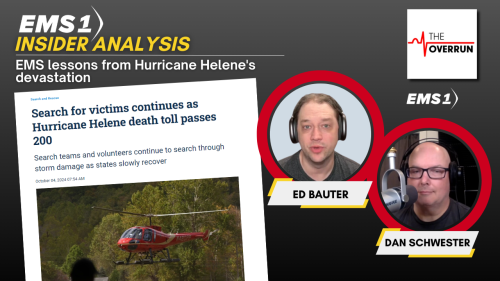By Aarik Long
The Mountaineer
HAYWOOD COUNTY, N.C. —Numerous homes were cut off from the outside world following Helene when roads washed away, smothered under landslides or were otherwise rendered impassable.
The Big Creek and Waterville communities, two of the most remote in the county, are not entirely cut off from the rest of Haywood, but impassable roads have made a long drive significantly longer.
Waterville and Big Creek lie in the far-flung corner of the county near the Tennessee line, normally reached via I-40 through the Pigeon Gorge. But I-40 has washed away and a timeline for repairs is at least two years out.
That presents an issue for emergency responders needing to answer calls.
However, emergency officials in Haywood County are working to ensure that no one goes without service.
“Nobody is being left behind,” said Allison Richmond, Haywood County Emergency Services public information officer. “Mutual aid agreements are already in place; we just need to formalize the uniqueness of this one.”
Haywood County Emergency Services already has a mutual aid agreement with first responders in neighboring countries, including Cocke County in Tennessee.
“We have these pre-standing arraignments. We always work well with our surrounding counties,” Richmond said.
Relying on Cocke County to respond to emergencies on the Haywood side of the line is nothing new. Landslides aside, I-40 has been plagued by traffic backups between exit 20 and the state line due to bridge construction projects the past two years.
“With the Gorge being the way it was, traffic would back up and it would be faster for them to get there,” Richmond said of the Cocke County first responders.
Given the prolonged nature of the I-40 repairs this time, however, the two counties’ emergency services are working on a formal contract for Cocke County to provide service to the area during this unprecedented time.
However, the details are still being worked out.
“We’ve never had to do anything like this,” Richmond said.
Those details include what payments may change hands between the two counties for the services being provided.
“I think it depends on the nature of the contract and how long it lasts,” Richmond said.
Typically, whoever transports a patient bills that individual. That means that even under the mutual aid agreement, whoever takes the patient to the hospital is the one being paid.
The agreement being developed would cover emergency medical services, but individual fire departments would have to work out a service contract to cover any assistance with fire response.
(c)2024 The Mountaineer (Waynesville, N.C.)
Visit The Mountaineer (Waynesville, N.C.) at themountaineer.villagesoup.com
Distributed by Tribune Content Agency, LLC.







